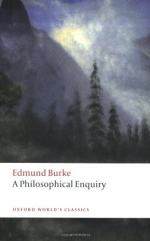
|
| Name: _________________________ | Period: ___________________ |
This test consists of 5 multiple choice questions, 5 short answer questions, and 10 short essay questions.
Multiple Choice Questions
1. What, according to Burke, affects the passions and most incites admiration?
(a) That which can be explained in lay terms.
(b) That which we know little or nothing about.
(c) That which is human made and manufactured.
(d) That with which we are closely acquainted.
2. What smells or tastes are, according to Burke, the only smells or tastes capable of producing grand sensations?
(a) Saltiness and flowery odors.
(b) Sweetness and spicy odors.
(c) Bitterness and terrible stenches.
(d) Sourness and tangy smells.
3. Why is suddenness sublime, according to Burke?
(a) Because the body's reaction is unpredictable.
(b) Because easy transitions are pleasant.
(c) Because that which is sudden is very interesting.
(d) Because the mind is suddenly put on its guard.
4. What is the main manifestation of infinity Burke mentions?
(a) A quiet walk in a grove of trees.
(b) A recurring dream or nightmare.
(c) A seemingly endless journey.
(d) A frequently repeated idea or motion.
5. What does Burke hope will be the result of his "A Philosophical Enquiry Into the Origin of Our Ideas of the Sublime and Beautiful"?
(a) Readers will apply principles of taste and passion to the otherwise severe sciences.
(b) Readers will leave the sciences behind in favor of imagination and passion.
(c) Readers will learn to control their passions when in specific social settings.
(d) Readers will be well-versed in the scientific method.
Short Answer Questions
1. What example does Burke use to demonstrate that differing tastes stem from the same basic root?
2. What literary example does Burke give as representative of magnificence?
3. What two aspects comprise Burke's "artificial infinity?"
4. Which idea is more effective over the other in affecting the imagination, according to Burke?
5. Into which two classes does Burke group the passions of society?
Short Essay Questions
1. What, according to Burke, is sublime about religion?
2. What is the difference between taste and knowledge, according to Burke?
3. Summarize Burke's section about the role of smells and tastes relating to the sublime.
4. Describe the main difference between light and dark relative to the sublime.
5. Describe the passions belonging to society, as Burke introduces them.
6. What kind of infinity exists in "pleasing objects," according to Burke, and what is an example he uses to support his claim?
7. What causes Burke to offer a second edition of "A Philosophical Enquiry Into the Origin of Our Ideas of the Sublime and Beautiful"?
8. What qualities of sound produce the sublime, according to Burke?
9. What does Burke identify as the central tension between the imagination and the judgment?
10. What is the cause of a wrong taste, and what are examples of it?
|
This section contains 1,043 words (approx. 4 pages at 300 words per page) |

|




